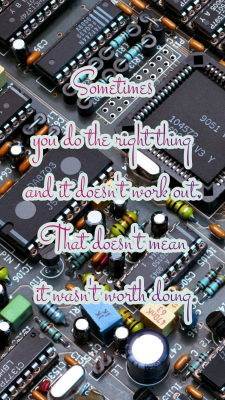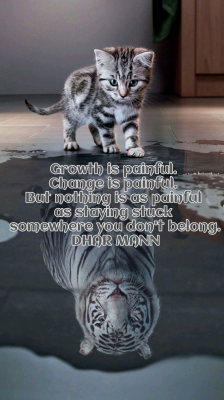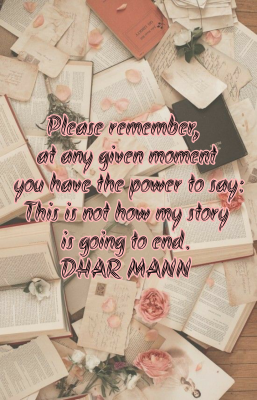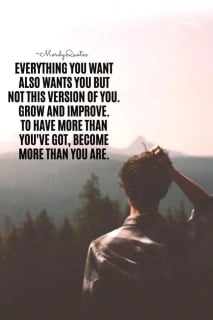Peaceful mind = Peaceful life
01.10.2021., petak
Wiring Your Brain for Positivity
|
Practice Makes Perfect Are you tired of being cynical? Ready to enjoy your own power, today, without waiting for the world to change? You can see good in the world by going beyond the information you’re wired to look for. You can learn to feel good in the world as it is instead of expecting an imagined world to make you feel good. Persevere and you will literally forget to be cynical because electricity will light up a new positivity circuit. You can do this through personal agency and realistic expectations. Personal agency is the awareness that your efforts can meet your survival needs. Realistic expectations is the knowledge that your neurochemical ups and downs come from a quirky mammal brain. With personal agency and realistic expectations, you focus on your next step, and you enjoy taking it. You focus your attention and you are not distracted by the world’s flaws. Negativity is natural because disappointment feels like a survival threat to this brain you’ve inherited. Cynicism helps relieve a sense of threat, but it comes at a price. It makes you powerless because you focus on things you can’t control instead of things you can control. Cynicism focuses your attention on old expectations, which makes new threats and rewards hard to see. Negativity is a bad habit that persists because our brains tend to rely on the circuits we built long ago. New circuits will build if you give your brain a new stream of inputs. This is hard to do, which is why people tend not to rewire themselves unless their inputs are altered by some outside force. Now that you know how your brain works, it will be easier for you to rewire your brain. But disabling your old circuits tends to trigger a sense of alarm. Your brain equates old habits with survival, so ignoring them feels like a survival threat. Upgrading your neural operating system is harder than upgrading your computer’s operating system because your brain must always be on so you can never hit ‘restart.’ When you try to stop an old habit, it feels like you are losing access to your hard drive with its lifetime stock of messages and images that remind you of who you are. But if you accept the temporary uncertainty, you will soon enjoy new ways of connecting up your experience. NEW CIRCUITS WILL BUILD IF YOU GIVE YOUR BRAIN A NEW STREAM OF INPUTS. You have power over your own circuits. Being your own personal agent feels better than lamenting the world’s failure to meet your needs, and realistic expectations feel better than equating frustration with a crisis. If you PARE, you will REAP, because realistic expectations help you act personally. Anyone can transcend their natural negativity by building PARE circuits. So let’s take a look at how to do it. The Positivity Habit Here is a simple way to feed your brain a new stream of inputs. Three times a day, stop and think of something good. Spend one minute each time scanning for the positive aspects of situations that are currently on your mind. Do this for six weeks and your brain will be trained to look for the good in the world. Define ‘good’ however you want. For best results, do not focus on puppies, rainbows, and butterflies. Look for good things relevant to your present reality. Here are some examples from my own positivity minutes. You can see that I’m actively constructing positives instead of passively waiting for good things to come my way. When someone is on my nerves, I think about the personal power I have that is not controlled by that person. When a tragic event gets my attention, I think about the improved responses to tragic events that were not available for tragedies throughout history. When I feel underappreciated, I think of how this frees me to develop my own instincts instead of being tempted to do the popular thing to sustain attention. When I feel conflicted about food, I think about the yummy foods I will choose when I am actually hungry, and how lucky I am to be able to choose these foods. When I feel separate from the herd, I remind myself that my inner mammal has many different, often-conflicting impulses, and I am lucky to be able to choose my response to each impulse in a way that enhances my long-term wellbeing. ACTIVELY AND CONSISTANTLY TRY TO MAKE TIME TO THINK OF SOMETHING GOOD. This exercise may feel awkward and false at first. You may think the good things you come up with are trivial. Your old circuits might tell you that these trivialities do not make up for the horrible state of the world. But in six weeks, your positive tidbits will feel as real as the negativity so widely expressed around you. It’s important to realize that this positivity habit is not a gratitude exercise: Gratitude puts you in the role of a passive receiver. You can find good in what you create as well as what you receive. You can be pleased with yourself as well as others. If being pleased seems weak or foolish, remember that you have the rest of the day to critique things. Nor is it a relaxation exercise: You do not need to relax while you’re doing it. Don’t expect joy in these moments, nor should you judge yourself for lacking it. Just keep finding good and your new expectations will affect your neurochemistry. This practice trains your brain to scan for good as naturally as you now scan for bad. Your automatic pilot will change if you do something different three times a day for six weeks, without fail. If you miss a day, start over at the beginning until you’re able to make it through six weeks straight. If you have trouble focusing on yourself, start with things that are good for others. “This is not objective,” you may say. But in six weeks, you will realize that your negativity was not objective either. It was just a habit. Your thought habits feel true because they sail along smooth pathways in your brain. But the boulevards of your mind were not built by objectivity. They were built by chance experiences in youth. You can build new boulevards even though it feels ‘not objective.’ This is an excerpt from The Science of Positivity, by Loretta Graziano Breuning |










































































